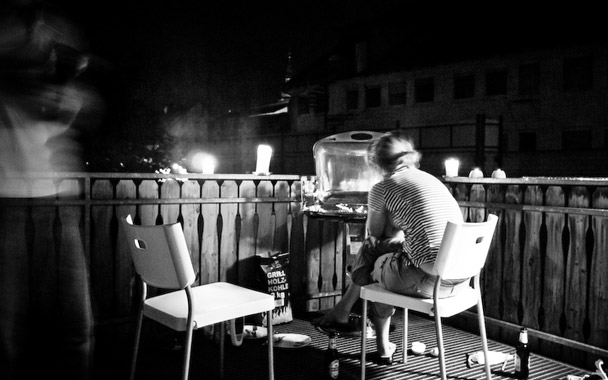Dave Flick, 56, is an avid griller who makes steak and pork ribs several times a week—but a few years ago, this seemingly innocent lifestyle landed him on the wrong side of the law. At the time, he lived in a two-story condo in Houston, Texas, and began grilling on his concrete patio (located directly below his upstairs neighbors’ deck). “It didn’t take too long for a letter from the landlord to appear in the mail,” says Flick, who was informed that he needed to place the grill at least 12 feet away from the building. Undeterred, Flick grabbed a tape measure and marked a new spot exactly that distance from his front door. “It meant I had to drag my Weber Smokey Joe across my light-colored carpeting and out to the front yard every time I wanted to cook, but I made do,” he says. Often when he lit his grill, neighbors would stop by to question him, so Flick kept a copy of the letter close by to shoo them away.
Unlike Flick, most cookout-loving apartment renters remain blissfully unaware of any rules their buildings or towns may have about grilling. But to those who do receive warnings or citations, it can feel unfair—why should homeowners get to have all the fun, while those who live in condos or apartments have to figure out clever loopholes in grilling law or else endure a charcoal-less summer? And when faced with such difficult choices, not everyone is as resourceful or even-tempered as Flick. Steve Marrs, a deputy fire chief in Colorado’s South Adams County for 30 years, will always remember the time he was giving a summons to an apartment dweller—and suddenly heard a loud crash in the parking lot. “The guy got so mad, he pushed his $2,000 stainless steel Ducane gas grill off the third-floor balcony,” Marrs says.
People who do bother to ask about the laws in their area often end up more confused than informed, because fire codes vary from state to state, and even county to county. Here are some examples:
• In New York City, “barbecues on residential property shall not be operated within ten (10) feet of any combustible material and there shall be available for use a garden type hose attached to a water supply or at least a sixteen (16) quart pail of water.” Propane grills aren’t allowed on balconies, terraces, or roofs.
• In Boulder, Colorado, you can use a propane grill anywhere—even on a balcony made from “combustible” materials like wood—as long as the tank’s capacity is 2.5 pounds or less.
• In Washington state, the use of grills in apartment buildings isn’t regulated by the fire department—instead, landlords and condominium associations make the rules. (In 2004, the Washington State Building Code Council tried to update the state fire code to include provisions about grilling on apartment balconies but backed down due to fierce public opposition.)
• And of course, the rules are always changing: Last summer, in response to a series of crippling wildfires, the state of California banned grilling on wooden apartment balconies that don’t have automatic sprinklers.
Punishment for grillers who get nabbed by the fire department varies widely, too: In Fairfax, Virginia, you can be fined up to $2,500 or jailed for up to a year; in Minnetonka, Minnesota, it’s a max of $700 or 90 days behind bars. And then some people get off with just a warning. But arcane though some of these rules may sound (a pail of water, really?), amateur grillers continue to give their fire departments reasons to enforce them. One person’s Weber mishap can easily turn into a headline-grabbing tale of major property damage: Nationally, there are more than 6,500 grill-related fires per year, resulting in $27 million worth of damage, according to the U.S. Fire Administration. Marrs has seen plenty of grillers light their fences on fire due to a common mistake: “People often rest the backs of their grills against their fences—but over time the heat dries out the wood and lowers its ignition temperature.”
Trying to skirt the rules is another way people get themselves into dangerous situations. Will Davis, 33, tells of one such scare: At the time, he lived in an apartment complex in Bethesda, Maryland and used a small hibachi on his wooden deck—even though he had heard from a neighbor that doing so was in violation of the property’s regulations. One evening, a bacon-wrapped steak he was making for himself and his girlfriend (now wife) flared up and started smoking—and almost simultaneously, Davis heard fire trucks heading his way. “I didn’t want to get fined by the fire department, but I also didn’t want to ruin my dinner,” Davis recalls. So rather than smother the grease fire in baking soda, Davis grabbed the sputtering hibachi, ran it into his house, and wedged it into the fireplace. “It seemed like a good idea at the time,” Davis says. But then the damper snapped shut on its own, filling the room with smoke. Davis was lucky: The fire trucks kept going (“turns out they were heading somewhere more important all along,” he says), and within an hour he was able to clear most of the smoke from his apartment—and even salvage his dinner. The outcome clearly could have been worse.
So as grilling season heats up, take a moment to contact your landlord or local fire department and bone up on the rules—particularly if you live in an apartment or condo. Just be prepared to stock up on tape measures and water pails.



 Pinterest
Pinterest


